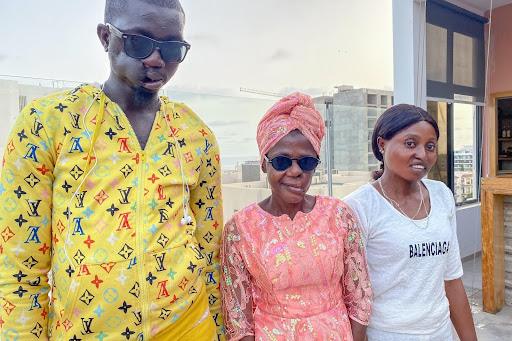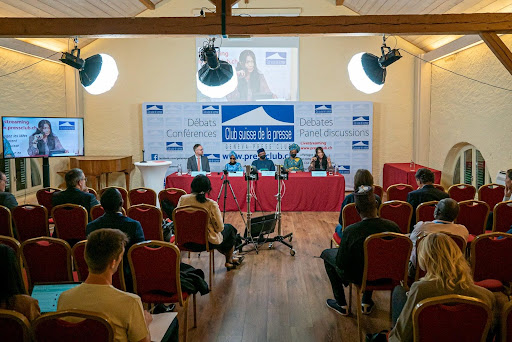They survived a disease few ever do. Then the hard part began
- Noma, a rare and devastating disease with a fatality rate of up to 90%, often remains undiagnosed until it is too late. For the few who survive “one of the world’s most under-recognized health challenges,” the struggle does not end with survival.

Image description: A woman wearing a patterned headwrap and a dress made out of newspaper clippings, embraces a younger woman in white. They stand against a lush mountain backdrop under a bright sky, evoking warmth and support.
In 1994, Fidel Strub was just three years old when the pain in his gums began. It crept quickly—into his jawbone, then his cheeks. Eventually, there was a hole on his face. Growing up in Burkina Faso, he watched his family struggle to find a diagnosis, to afford treatment, and to make sense of what was happening. But every effort led to the same end: nothing worked.
Strub was suffering from noma.
Noma, a little-known but devastating noncommunicable disease, often begins as a seemingly harmless sore in a child’s mouth. But without immediate intervention, it turns merciless, eating away at flesh and bone. Nine out of ten children who contract it die. Those who survive are left with devastating facial disfigurements—unable to eat, speak, or move through society without stares or silence.
“I couldn’t understand why I got the disease while others didn’t,” Strub says now.
Days later, hope came in the form of a radio broadcast. A local campaign was calling for people with facial holes to travel to northern Burkina Faso for potential treatment. His grandmother heard it, packed him up, and sent him north.

That moment changed everything. Strub would go on to have his first reconstructive surgery in Switzerland. Between 1994 and 2005, he underwent 27 surgeries.
Derived from the Greek word nomē, meaning “to devour,” some noma survivors turn to Reconstructive surgery essential to restore both appearance and function—addressing the extensive tissue loss caused by the disease. Techniques vary and may include skin grafts, local flaps or complex microvascular-free flaps, all aimed at restoring facial structure, oral competence and the ability to chew.
“Noma, a disease that causes immense pain and challenges, affects not only physical health but also mental well-being, social inclusion, and rehabilitation,” notes Strub, who has now gone on to co-found Elysium, an organisation supporting survivors of Noma.
Elysium is a support network for noma survivors, offering discussion groups, shared experiences, and professional counseling. Founded by survivors Strub and Mulikat Okanlawon after a meeting at the 2022 World Health Assembly in Geneva, Switzerland, it advocates for greater awareness and was instrumental in securing WHO’s recognition of noma as a neglected tropical disease.
The name “Elysium” symbolises the final resting place of heroes and the pure. The organisation honours the memory of those lost to noma, especially children who endured unimaginable suffering.
Elysium believes that surgery alone cannot transform lives, even if it restores crucial functionalities like eating, breathing, or speaking. Social acceptance and reintegration remain lengthy, challenging processes. That’s why the organization advocates for a holistic approach that encompasses aspects from nutrition to mental health support and physiotherapy.

For Strub, this was a need he first identified in his co-founder, “Mulikat always says it took her 15 good years to accept what happened to her,” he says.
Awa, a noma survivor and honorary member of Elysium, understands the weight of social acceptance in a way few can. Before her reconstructive surgery, the disfigurement left by the disease often drew long, uneasy stares from strangers.
When she left her rural village in Senegal for Dakar, the capital, in search of work, Awa met a well-wisher who, after a long conversation about noma disease, offered help towards Awa getting surgery.
Her path to healing was long. It involved countless hospital visits and a partnership with Senegal’s Ministry of Health to secure the medical support she needed. In September 2019, two years after meeting the well-wisher, Awa traveled to Guinea-Bissau, where she finally underwent surgery.
When she returned to Dakar, it wasn’t just her appearance that had changed; she felt a profound sense of relief and improved health.
In June 2023, Awa and fellow survivor, Boubacar, attended a regional conference in Dakar, organized in partnership with the Ministry of Health and Médecins Sans Frontières/Doctors Without Borders (MSF). There, they met Okanlawon and Claire Jeantet, an advocate for noma survivors.
Jeantet, also a filmmaker, initially documented noma survivors’ stories for a film co-directed and produced in partnership with MSF. She is a board member of Elysium. After speaking with Okanlawon, Awa and Boubacar joined Elysium as honorary members.
“Over the years, we have realised the significant impact of having survivors speak firsthand to the audience,” Jeantet says. “We have been presenting the documentary I produced since 2019, first with Mulikat and then with Fidel since 2021. We have observed the difference it makes to have a survivor present when organising meetings with policymakers, global health influencers, and other stakeholders.”
Since 2022, Elysium has connected with noma survivors across six countries—including Burkina Faso, Mozambique, Niger, Nigeria, and Senegal—establishing informal support groups that serve as lifelines. These gatherings offer more than just a space to talk; they provide platforms for survivors to share their experiences, find solace in one another’s stories, and build a sense of collective strength.
“Isolation is a challenge. We struggle with stigma and are often ostracised, which hinders our progress and healing. Knowing other survivors exist offers hope and a sense of security,” Strub emphasises.
Recalling her own journey, Okanlawon shares, “I faced discrimination and isolation due to my noma condition. People avoided me, and I felt like an outcast. However, after treatment, I learned to accept myself and move forward. I want other noma patients to know they, too, can overcome challenges and live normal lives. It’s crucial for survivors like me to share our experiences and inspire others to do the same, rather than suffer silently and fall into depression.”
Okanlawon contracted noma around the age of six. Her grandparents, with whom she lived, did their best to treat it, but the disease worsened, severely affecting her face. She received treatment at a hospital near her village before being referred to the University of Ibadan Teaching Hospital. Despite treatment there, her condition did not improve. She returned home, attended primary school, and was later referred to another hospital where her first surgery failed after multiple attempts.
“The outcome led to more panic and emotional instability for me and my family. I was crying all the time. During that period, I often wished I hadn’t survived to witness it all—the sadness, stigma, and emotional impact caused by this disease,” says Okanlawon.

Later, she met a professor in Lagos who referred her to the Noma Hospital in Sokoto. There, she underwent numerous successful surgeries. Afterwards, she gained confidence and took on her first job as a cook at the hospital.
Determined to further her education, she enrolled at the School of Health, Gwadabawa. Though she lost her job during her studies, she earned a diploma in Health Information Management. She later joined Médecins Sans Frontières at the Noma Hospital as a hygiene officer (now a health promotion officer), working with the mental health department to support patients and families by sharing her journey of recovery.
“When interventions are scheduled, patients from different places often come. We gather them and share experiences. Sometimes, they invite me, a survivor, to share my story with them,” she says.
During the World Health Assembly conference, Okanlawon and the former Minister for Health Osagie Ehanire advocated for noma patients and survivors, stressing the need for noma to be included on the neglected tropical diseases list. This led the Nigerian government to champion noma’s inclusion in 2023, following the resolution on oral health adopted at the 2021 World Health Assembly.
The true magnitude of noma’s impact remains unknown, including the number of those affected or who have survived. WHO Director-General Dr Tedros Adhanom Ghebreyesus calls it “one of the world’s most under-recognised health challenges.”
Despite being known for centuries, noma remains poorly understood and rarely detected. With a fatality rate of up to 90%, the few who survive face lifelong challenges. WHO’s last estimate in 1998 reported 140,000 new cases annually, with a prevalence of 770,000. However, recent evidence suggests the reported fatality rate may now be lower, and early treatment can significantly improve outcomes.
Prof. Jacob Legbo, a Nigerian plastic surgeon and leader of an MSF surgical team, emphasises that noma is predominantly linked to poverty, inadequate oral hygiene, and malnutrition. He further notes that many cases stem from acute illnesses such as measles and gastroenteritis.
Legbo advocates for educating both rural and urban populations on the significance of oral hygiene and nutritional health. He adds that survivors of noma can demonstrate its preventability and treatability, urging adherence to immunisation protocols. He also proposes that these survivors serve as ambassadors for the disease, showcasing that life can thrive beyond noma.
Elysium was founded to fill a void—support for survivors of noma. Today, many of its members, like Okanlawon, have gone on to pursue higher education and careers in medicine. Among them is Vava, from Mozambique, who now works as a nurse aide. Vava developed a deep interest in medicine while undergoing facial reconstruction and is currently seeking employment in the health sector.

To bolster economic independence among survivors, Elysium is launching the Generating Income Activities initiative in collaboration with local partners. The program aims to provide survivors with the tools and training needed to build sustainable livelihoods. Boubacar hopes to start a small farm. Awa, meanwhile, dreams of launching her own business.
“She’s the sole provider for her family back home,” said Jeantet, referring to Awa. “Each time she returns to her village, she loses her job and her accommodation in Dakar. Having her own business would give her the flexibility and independence to move between the city and her village.”
Despite these successes, Elysium continues to face significant hurdles, including financial constraints and language barriers. In response, the organization is building a network of allies to support translation and communication efforts.
Still, these obstacles have not discouraged the founders. They confront each hurdle as it arises, all while continuing to inspire empathy, advocate for prevention, and push for the eventual eradication of noma.
“This process takes time,” Jeantet says. “But it’s ongoing.”
Edited/Reviewed by PK Cross, Uzoma Ihejirika, Caleb Okereke, Awom Kenneth and Samuel Banjoko.
Illustrated by Rex Opara.

